
Personal Growth & Wellbeing Articles
Therapy-Talk seeks to enhance the resources and experience of individual people through articles about personal development that might inspire you.
Archive: All Posts
Communication skills: Assertiveness training
Authenticity lies beyond limiting identifications and roles
How to give or receive constructive feedback
Cooperation rather than competition
Symptoms and factors that help to overcome stress
You are already whole and complete
Bullying or psychological harassment
Communication skills: Empathy
Empathy is one of the most important communication skills and consists of listening carefully, trying to grasp the reality of the person who is speaking. This means being able to see the world from their point of view without judgment or giving advice.
It is also necessary to respect the pauses and not to interrupt to tell something similar that has happened to us or to others. Just speak to clarify a point that has been unclear. Finally, we can communicate with our own words that we understand their point of view even if it is different from ours.
The ability to empathise with another can help build trust and it is the basis to resolve any conflicts. It is easier to negotiate and to take into account each person's needs and expectations, if both are willing to understand and respect the other.
Principles to facilitate communication with active listening:
- Make your interlocutor feel comfortable and demonstrate that you are interested in what they have to say.
- Do not get distracted, move papers or do any other activity that prevents listening.
- Try to put yourself in their place, so you see the situation from their point of view.
- Be patient, and allow them to take time to talk.
- Control your temper, as an angry person often misinterprets messages.
- Do not criticise or argue, since it puts the other person on the defensive.
- When it is your turn to speak, clarify your doubts.
- This shows you have been listening and encourage trust.
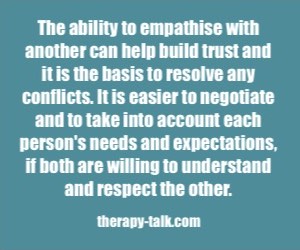
Inma Romero
Communication skills: Assertiveness training
Factors that prevent us from setting boundaries and being assertive:
If we do not act according to our principles and we tend to say “yes” when we want to say “no”, then we might end up loading ourselves with responsibilities that produce stress and undermine our dignity. Furthermore, it causes resentment and damages self-confidence, as there is a tendency to feel used by others.
External factors: Sometimes the responsibilities and expectations of our work and family are difficult to change, but you can learn to negotiate, delegate and organise your time.
Internal factors: The demands we place on ourselves by insecurity and trying to please others due to a lack of self-esteem, often leads us to think that we "have" to do something.
Different styles of verbal communication:
Aggressive: People with an aggressive approach do not allow negotiating because they fear loosing their power and want to impose their views.
Passive: They have developed a pattern in which they are afraid to assert their rights. Therefore, they let others control or manipulate them and subsequently feel humiliated or let down when things do not go as expected, which in turn reinforces their low self-concept.
Assertive: Individuals with an assertive approach have the ability to express their opinions, emotions and boundaries in an appropriate manner. They assert their rights and look after their own needs.
Setting boundaries and being assertive:
Assertiveness is to communicate your rights and needs in an open and honest manner while respecting the dignity and views of others. Moreover, to set boundaries requires the ability to place appropriate limits or conditions on the demands that others make on our time and energy. Therefore, it is necessary to exercise assertiveness and set limits to facilitate a balance between the demands of work and family life on one hand and having leisure time for our own wellbeing on the other.
Sometimes other people may try to manipulate a situation by adopting a tactic of criticising and undermining in an attempt to achieve their aims. Some techniques might help, such as the broken record, which consists of repeating your opinion without explaining or getting entangled in the issue, but trying to keep a neutral tone and remaining firm.
Similarly before responding to a request, you can ask for time to think about it. If you want to respond “no”, it will help you to stay calm and present your case with confidence after reflecting on your decision. There are several more assertive techniques that we offer in our coaching and personal development workshops in order to enhance confidence and improve communication skills.
Inma Romero
Authenticity lies beyond limiting identifications and roles
Outgrowing and shedding identities is a very distressing experience, almost like a death sometimes, but also a very crucial part of the ongoing evolution of our sense of self. Within our adopted identities we play roles in interaction with others in the drama we take life to be. For as long as this life gives us the opportunity to develop essential qualities of human potential, and provides the motivation for creating meaning and purpose for ourselves, we settle in that existence.
If however we come to a realisation, gradual or sudden, that we no longer fit the script and the character we have been cast in, we feel obliged to search for a more authentic, truer self. It is a difficult transition we usually follow reluctantly and resentfully but the alternative is no longer tolerable.
In the course of this process of ongoing expansion and multiple identity shedding, we eventually come to another realisation: The paradox that our freedom from each identification leads us towards our original state of Naked Beingness, the only sense of self that is beyond identities, and therefore beyond separation from our authentic self and other people. The support for facilitating and navigating the journey towards freedom and authenticity is one of the main purposes of our Counselling Services.
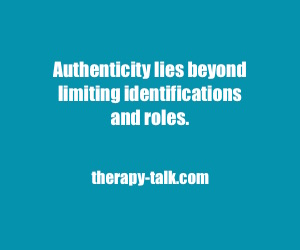
Nitsa Economidou
How to give or receive constructive feedback
Some people react to feedback defensively, angrily or retaliating with a hurtful comment and at the same time criticising the conduct of the other person by recalling past mistakes. Other people tend to feel insecure and accept any comments, never thinking that a critique could be unfair but instead feeling that they have failed again. These people reproach themselves when they hear negative comments and take all the blame.
Giving feedback is a sensitive situation that tends to generate conflict. In order to be heard and facilitate positive change, we must offer constructive comments. If possible, try to choose the right time and seek privacy. Before the meeting prepare the situation, rehearse what you are going to say and be considerate with your choice of words. It is not about making judgments about their personality or behaviour, but pointing to concrete facts and how they affect you.
Sometimes situations arise unexpectedly, in which case if the other person tries to silence you or becomes personal, try to be calm, assertive and just repeat your feedback. In any case, when it is possible, start with a compliment that is genuine. It is easier to listen to criticism if there is an acknowledgement of positive qualities first. Then express your opinion in a positive, relaxed manner and without making value judgments. Criticism should never be humiliating or a personal critique. The purpose is to seek a solution, without antagonism.
Describe what you want to change, sticking to the facts and how they impact you. For example, if your neighbour is very noisy, do not say: “You're selfish, your music is very loud” (Judgment). Instead you might say: “Perhaps you are not aware that we can hear the music quite loud and it is difficult to rest”.
Suggest different options, rather than insisting on one point of view. For example, search for his/her collaboration: “Do you think?” or “How do you think we can solve this?”. It is about finding a solution, not to put the other person down.
Sometimes conflict is inevitable because nobody likes a critique, but if you are receiving the feedback try to negotiate, stay calm and do not get angry or defensive but listen carefully to what they have to say. Think that they are criticising a specific event, not you as a person.
Reflect about what they said and ask for a few minutes to think about it. Then meditate if there is any grain of truth, so that you can learn to take responsibility for your actions. Finally, decide if the criticism is fair or not, if it is admit it, if it is not discard it. If the criticism is valid, even if it hurts, think about how you could change that behaviour.
Above all do not let them hurt you, shout at you or humiliate you, since without respect you cannot give or receive a critique. Keep in mind that a constructive feedback can help another person to understand how their behaviour affects others. On the other hand, a criticism made without consideration can damage self-esteem.
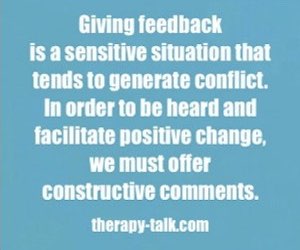
Inma Romero
Cooperation rather than competition
We live in such competitive times that I would like to reflect on this race that seems to lead nowhere. The evidence indicates that excessive competition generates a very aggressive energy and represents the opposite of collaboration. Competition can promote rivalry, selfish attitudes and often leads to manipulation to satisfy personal ambitions at all costs. Individualism and competitiveness cause great anxiety, stress and bullying in all spheres of society.
Instead, the evidence shows that people who collaborate face better the changes and challenges to achieve their objectives. In addition, they respect differences and appreciate the skills that everyone provides in the group to facilitate the common purpose. Cooperation emphasises that each person has something valuable to contribute and the synergy of the group creates a process that is above the individual or his vanity, and where everyone can learn and benefit from each other.
On the other hand, personal wellbeing is essentially linked to the group and the community, given that we are interconnected and what affects "the whole" impacts everyone in the end. That is why, I believe that the greatest triumph is not to be the first or the best, but to reach the goal together and learn to collaborate rather than compete.
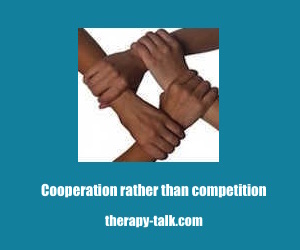
Inma Romero
Self-expansion
Who Am I? A very good question to ask ourselves, especially at times of disturbance.
The feelings of disillusionment, anger, sorrow, fear and guilt come from an identification with the content of our consciousness. The story our thinking spins about our predicament in the drama of our mind.
If it is hurting we are cast in victimhood role. It feels real because we believe unquestionably the script. But is there another story, a bigger context in which we are participants, parallel to the intense melodrama we find ourselves in time and time again?
Perhaps an answer glimmers high up in the stars, when we look with wonder at the mystery of what the reality of the cosmos we are part of is. Perhaps we can let go of the worry and the effort of controlling our universe. The firmament appears to hang well together and the celestial bodies move effortlessly and harmoniously. Perhaps we dare to ride along, feel part of everything and be at home just where we are.
Nitsa Economidou
The quest for authenticity
We seem to be on a never-ending mission for an identity that feels comfortable, rational, intelligent, exciting, promising, attractive, and all the 'positive' qualities we think would make us, and our lives, worthwhile.
These preconceived ideas are part of the stream of thoughts that flow naturally through us and are not restricted to pleasant states of mind only, however hard we try to avoid 'negative' identifications such as fear, anger, envy, sadness and numbness.
So since both our 'selected' selves, as well as those we try to avoid, are part of a passing parade of elusive concepts we need an alternative approach if we can have a hope for breaking out of this futile process.
It seems that our hope for interrupting the compulsive reconstruction of false identities lies in the letting go of conditioned expectations and knowledge, and allowing instead space for 'not knowing', for being open to fresh, deeper glimpses of reality, new understanding and wisdom perhaps.
Meditation is a way to consciously observe the thoughts as they emerge and deliberately letting them go.
Counselling and coaching are also effective methods to speed up the process of change by increasing our awareness of the conditioned ways we operate and by helping to free ourselves from patterns of restrictive thinking and behaviour.
Nitsa Economidou
How to enhance your wellbeing
Try to be as objective as possible in your interpretation of reality. The anxious person tends to worry about everything. They often incriminate themselves, adopt attitudes of victims or are very perfectionists. So, it is important to identify the illogical or distorted perceptions that promote negative thoughts and concerns. Examples of distorted thoughts:
- Catastrophism: To view the reality in a terrible and pessimistic way.
- Overestimation: To exaggerate a negative fact.
- Generalisation: To think that a single event will be repeated forever.
- Filter: To ignore the positive and focus on the negative.
- Emotional Reasoning: The erroneous evaluation of a situation under pressure of intense emotions.
- An exaggerated sense of duty.
Other positive steps to improve your emotional wellbeing:
- Defend your rights by being assertive: Assertiveness is to state your rights, needs and opinions openly, respecting the dignity of others but remaining firm.
- Express your emotions correctly: Repressed feelings are as harmful as the lack of control of their expression.
- Learn to be calm: Practice relaxation techniques, visualisation and meditation to achieve emotional wellbeing.
- Nurture your sense of humour and optimism: A smile generates the corresponding emotion and you will begin to feel better. It also promotes the ability to think clearly and makes it easier to find solutions to problems.
- Develop your creativity: Always a source of encouragement and self-esteem. Creativity is the ability to create, to formulate ideas, to imagine and solve problems in a different way.
Inma Romero
The power of thoughts
The role that thoughts have in our emotions and the ability to accept or overcome difficulties is essential. If the dominant thoughts are negative and critical, then the capacity to transcend them is diminished and affects the self-esteem.
Read more: The power of thoughts
Inma Romero
Improve your self-confidence
Self-esteem is the love and care we give to ourselves. Self-regard is measured not by how others perceive us but by the opinion, we have of ourselves and by our ability to meet the challenges of life. The important thing is how worthy we consider ourselves to be.
Read more: Improve your self-confidence
Inma Romero
Symptoms and factors that help to overcome stress
Psychological Symptoms:
- Fears and anxiety
- Memory loss and concern
- Depression
- Anger, guilt or resentment
- Frustration and loss of motivation
Read more: Symptoms and factors that help to overcome stress
Inma Romero
You are already whole and complete
What we are searching for is not somewhere else, something more, or somebody other than ourself to make us whole and complete. External events and situations may well trigger feelings of satisfaction, achievement, fulfilment and expansion of self-esteem, however short-lived they may be, but harmony, peace and self-worth are states of our natural being, permanently residing inside us, before we learnt to doubt ourselves.
We do not need to acquire or learn any more than we already have and know in order to connect with these states of mind. All it takes is a gentle reminder that the option is always open for us to resonate with this permanent truth of our nature: We Are Whole And Complete just as we are, in our individuality and uniqueness.
Nitsa Economidou
Bullying or psychological harassment
It happens in all walks of life, not only in schools and at work, but also in the neighbourhood, cultural and sports associations. In an increasingly competitive society, violent and unstable, this type of conflict is widespread. Although, the most common image is that of the bully who terrorises other children, with their cruelty in the schoolyard. This child will become later the adult bully, so it is very important to have campaigns of education and prevention for
Read more: Bullying or psychological harassment
Inma Romero
Managing stress
Stress is our response to the physiological and psychological challenges of life and the potential for change in our environment. It is caused by activation stimuli, such as fear of danger or pain, which alters the physiological order of the person.
Read more: Managing stress
Inma Romero
Positive visualisation
First sit or lie down in a comfortable and quiet place, then close your eyes and visualise a wonderful landscape where there is a big tree looking down on the river. Sometimes the current overflows the land, while other times the stream is peaceful. However, the torrent always flows down passing through on its way to a new territory.
Imagine that you are the tree looking down on the river and that the flowing waters are your emotions. Embody the tree and see your feelings moving down the river. Realise that if you are suffering now, it will pass. Like the stream, emotions are just passing through. Let them go. Remember this image of the water flowing on when you feel vulnerable. Nothing stays unchanged forever.

Inma Romero
To be free from self-doubt
To free ourselves from self-doubt, that creates confusion, tension and disturbance of our stability and peace of mind, is a decision we can make. Since it is only the result of a passing thought, we can choose to let it pass by focusing on a different thought, a thought that inspires by reminding us that we are each a unique specimen of humanity and a gift to each other like no one else. Be yourself to be the special present you are and a living reminder of the specialness of all.
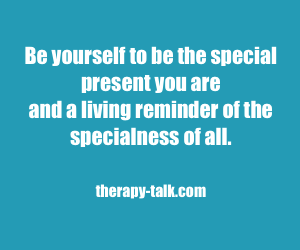
Nitsa Economidou
